COVID-19 has highlighted the need to work with researchers all around the world at the same time that it has also exposed the inequalities in the global research and knowledge system. In this piece, John Young from the International Network for Advancing Science and Policy (INASP) reflects on the importance of an equitable knowledge system as well as the challenges and opportunities for achieving this that the change in circumstances has bought.
COVID-19’s effects on the global research system
The current COVID-19 situation has highlighted and amplified many of the underlying inequities in global research and knowledge systems that we are committed to working with others to address.

As Jon Harle discusses in a new paper, beautifully illustrated by Hamsi Evans, the cracks in knowledge systems that already exist between different parts of the world, different groups of people and different types of knowledge have widened through the current crisis. The opportunities to continue generating, sharing and using research and knowledge are much easier for those with good access to IT equipment and infrastructure, continued funding for their work, good professional networks and no caring responsibilities.
Toward an equitable knowledge ecosystem
INASP is an organisation that aims to strengthen the capacity of individuals and institutions to produce, share and use research and knowledge in Africa, Asia and Latin America. It works across the research and knowledge system, with a focus on: Evidence for policy & practice, Research capacity, understanding and supporting impact, higher education & learning.
Our study of early-career researchers during April – as well as a series of blog posts on our AuthorAID blog – have revealed a range of problems caused by the pandemic but also that different people experience these problems more or less severely. And, in some cases, the levelling effect of nobody being able to travel to conferences or for research collaboration has created new opportunities and shifted old power dynamics.
Building islands of excellence is not enough. What we need is a knowledge system that includes every voice and fosters every talent.
In May we launched a new five-year strategy that sets out our ambitions to continue to work with others towards building more equitable knowledge ecosystems that include every voice and foster every talent. However, what we didn’t anticipate as we worked through our strategy process throughout 2019 was that we would end up launching our strategy into a global pandemic. We didn’t anticipate the total cessation of international and most domestic travel in the UK and our partner countries, or that our staff and partners would have to work from home.
While a key direction of change in our new strategy was to travel less and do more of our work online, we had planned plenty of face-to-face conversations with partners and others about how we could do this while still contributing to our vision of a global coalition working together to keep research and knowledge at the heart of development. Of course, all of that evaporated more or less overnight.

Responding to changing circumstances
In working towards equitable knowledge ecosystems, in a global coalition, INASP is just one actor among many, each bringing their unique attributes to the table. We need to be more collaborative and more responsive to the needs of our partners.
We have had to draw on all of our 28 years of expertise and experience in facilitating connections and collaborations between our partners, and our expertise in adult pedagogy, online learning and digital platform development to be able to continue to support our partners in the current crisis.
For example, we have had to develop and deliver online training of trainers for facilitators and mentors of the course redesign process in East African universities – work that our partners and INASP had previously planned to run in face-to-face workshops.
We had to switch what had been planned as a gathering of like-minded Oxford-based development research, policy and operational agencies to discuss how best to support southern researchers into an webinar on reshaping research in the time of COVID-19. That webinar enabled engaging discussions and concluded that:
“the changes in relationships and roles that are emerging in these projects could be the start of a much wider realignment empowering researchers in the Global South”.
The second of the cases described in that webinar, a school health promotion project in Northern Nigeria, is a collaboration between the Family and Youth Health Initiative (FAYOHI), Bayero University, and the Ministries of Health and Education in Kano, the Aga Khan University in Uganda, and the University of Hull and INASP in the UK. We had been planning to spend two weeks in Kano meeting different stakeholder groups and running a series of face-to-face events to co-design the next phase of work.
We had to do all of that online – made doubly difficult by a thunderstorm which took out the internet in Kano on the day of the first online workshop. But, with a combination of plenary and breakout sessions in zoom, and participants filling in online forms, it worked out much better than expected. The picture here, produced by one of the participants, Professor Dasapta Erwin Irawan from the Institut Teknologi Bandung, Indonesia – shows the conclusions of the Kano workshop.

An interesting final twist with this work was the suggestion, in an after-action-review of the workshops, that for further workshops, the local FAYOHI team could convene all the local stakeholders physically and the international partners could join virtually. That would certainly enable us to contribute to more work on the ground and ensure that our Southern partners are firmly in control.
2020 is turning into a very strange year with plenty of challenges, but also exciting opportunities to take stock and explore different ways of working. It is vital that we find way to continue to work together, to build the coalition, and ensure that research and knowledge remain at the heart of development.
The COVID-19 crisis has confirmed that a strong knowledge system is key to a just, peaceful and sustainable world. It shows that solving challenges like this must draw on research from around the world, building on experiences of dealing with previous disease outbreaks, making decisions based on understanding of local contexts, and sharing insights and research results from different countries. Building islands of excellence is not enough. What we need is a knowledge system that includes every voice and fosters every talent.
For more information, see our strategy and get in touch if you would like to be part of building this vision together.
This is an edited version of an article, originally published on the INASP blog.
Note: This article gives the views of the author, and not the position of the LSE Impact Blog, nor of the London School of Economics. Please review our comments policy if you have any concerns on posting a comment below.







